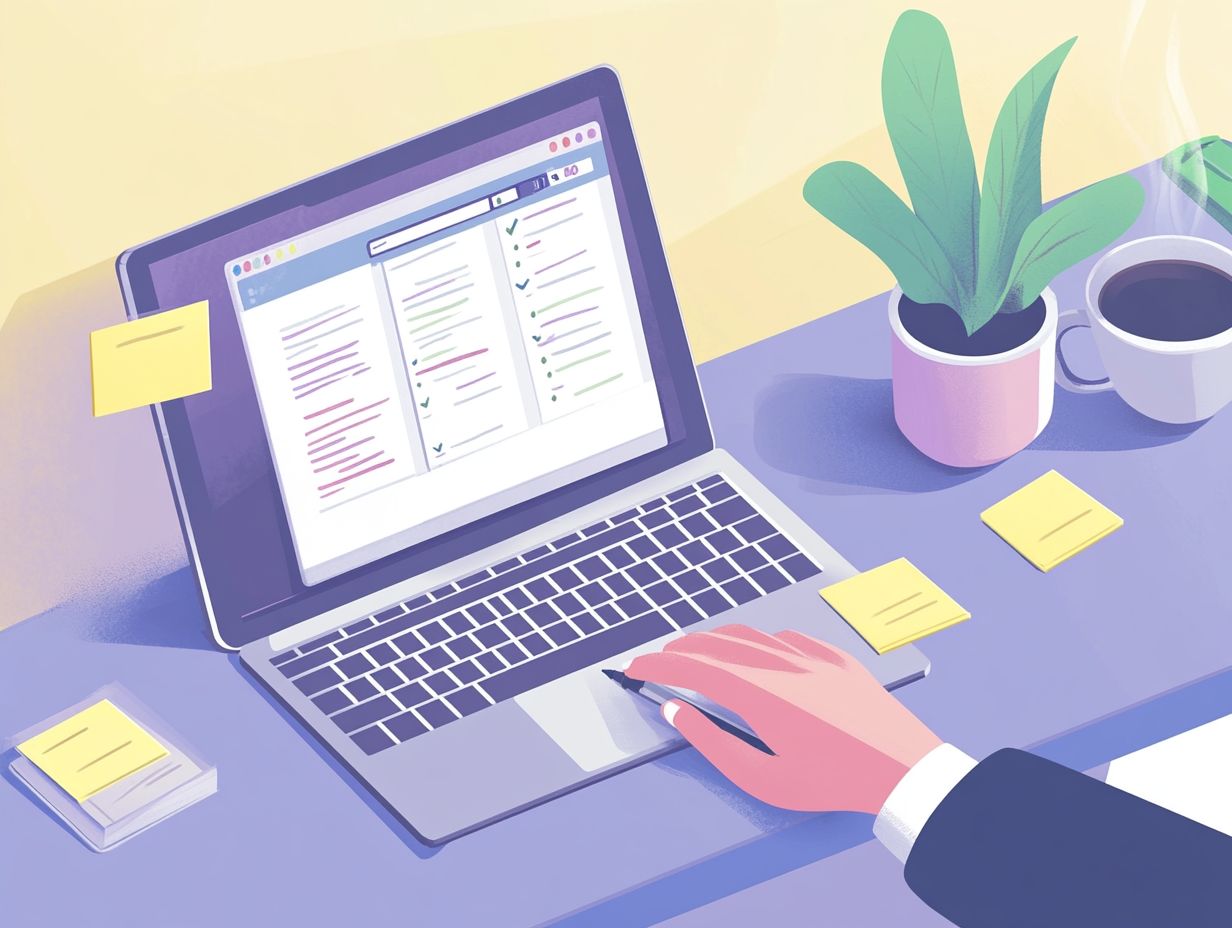In today’s dynamic work environment, effective task management is essential for achieving success and maintaining a sense of work-life integration and balance. This article examines the critical aspects of task management, detailing its significance and exploring impactful productivity strategies and motivational techniques. It addresses key components such as prioritization, goal-setting, and the various digital and physical tools that can be utilized to streamline workflow. Furthermore, strategies for collaboration and workload management are discussed, emphasizing the advantages of efficient task management in enhancing productivity, increasing job satisfaction, and reducing stress. Prepare to transform your approach to task management, master your to-do lists, and elevate your work experience through actionable tips.
Key Takeaways:
Understanding Task Management

Task management is an essential discipline that entails the organization, prioritization, and effective execution of tasks to achieve defined objectives and enhance personal productivity.
In the contemporary, fast-paced work environment, mastering task management not only streamlines operations but also contributes to improved time management, reduced stress levels, and enhanced personal productivity.
Productivity experts highlight the importance of employing digital tools, such as project management tools, and strategies to maintain clarity and focus on tasks, ensuring that urgent and important tasks are completed with efficiency. As noted by Microsoft, effective task management can also facilitate the transition to a hybrid workplace by leveraging digital tools that enhance organizational effectiveness.
By adopting structured methodologies and efficiency strategies, individuals can effectively manage their to-do lists, overcome procrastination, and attain a healthy work-life balance and improved mental health.
Defining Task Management and its Importance
Task management encompasses the process of overseeing tasks from their initiation to completion, ensuring accountability, focus on tasks, and adherence to established goals.
Effective task management not only streamlines activities but also significantly enhances personal productivity, facilitating the prioritization of tasks and tracking of progress with task visibility.
By decomposing larger projects into smaller, manageable tasks, individuals are able to maintain clarity, reduce stress, and mitigate feelings of overwhelm. The implementation of tools such as digital to-do lists or project management software further enhances task organization, delegation, and task completion capabilities.
Regularly reviewing and adjusting priorities empowers individuals to remain adaptable and manage time more effectively and effectively address any obstacles that may arise. Mastering task management cultivates a proactive mindset, ultimately leading to improved outcomes and personal satisfaction in both professional and personal pursuits.
Effective Task Management Techniques
Effective task management techniques are crucial for enhancing productivity and achieving defined goals. This entails a structured approach to prioritizing tasks and breaking them down into manageable steps.
Prioritizing Tasks and Time Management

Prioritizing tasks is a fundamental aspect of effective time management and attention management, enabling individuals to distinguish between urgent and important tasks and allocate their time accordingly.
This skill is essential for both personal productivity and professional success, as it allows individuals to maintain focus on what truly matters, thereby improving personal productivity rather than becoming overwhelmed by daily distractions.
To enhance task prioritization, one may consider utilizing frameworks such as the Eisenhower Matrix, which categorize tasks and establish task dependencies into four quadrants based on their urgency and importance. Asana provides a detailed guide on this matrix, which can help individuals avoid falling into the “Urgency Trap” (as highlighted in a recent Asana resource).
For instance, a task with an immediate deadline may be classified as urgent, whereas important tasks, such as long-term project planning, may be neglected if not prioritized appropriately.
Additionally, tools such as Trello or Asana can assist in the visual management of tasks, clear deadlines, and task breakdown, ensuring that pressing responsibilities are identified and addressed in a timely manner.
Breaking Down Tasks and Setting Goals
Breaking down tasks into smaller components is an effective strategy that provides a project overview for goal setting, as it transforms large projects into actionable and manageable steps.
By dividing a significant objective into clearly defined, smaller tasks, individuals can maintain focus and motivation throughout the entire process. This approach not only alleviates the overwhelming feelings often associated with ambitious projects but also facilitates easier tracking of progress.
To implement effective task organization, one should begin by outlining the main goal, followed by identifying key milestones and the specific steps required to achieve each milestone.
Prioritizing these tasks can further streamline efforts, ensuring that the most critical actions are addressed first, leveraging historical data for informed decisions. Additionally, utilizing tools such as to-do lists, digital calendars, or digital project management applications can enhance accountability and foster a sense of accomplishment as each task is completed.
Tools for Task Management
The utilization of appropriate task management tools is essential for enhancing productivity.
These tools offer structured support for organizing tasks, establishing deadlines, and monitoring progress effectively. For context, an in-depth analysis by Forbes discusses various software options that can significantly improve how tasks are managed and executed.
Digital and Physical Tools for Task Management

Digital tools, including task management systems, project management software, and time management tools, are essential for the organization of tasks, task completion, and task organization, while physical tools such as planners also play a significant role in enhancing productivity strategies and developing a productivity blueprint.
When utilized effectively, these tools can greatly streamline workflows, improve communication, prioritize tasks, and enhance active collaboration, thereby allowing individuals and teams to concentrate on their most important objectives.
For example, widely used digital platforms such as Trello and Asana offer features that facilitate collaboration, enabling users to assign tasks, establish deadlines, and monitor progress in real time.
Conversely, physical tools like bullet journals or traditional planners, highlighted by productivity experts such as Maura Thomas, provide a tactile experience that can reinforce commitment to daily goals. By integrating both digital and physical methods, users can develop a customized productivity strategy and efficiency strategy that not only addresses their unique needs but also enhances motivation and accountability.
Task Management Strategies for Work
The implementation of effective task management strategies within the workplace can substantially enhance operational efficiency, foster team collaboration, and contribute to a reduction in stress levels among employees.
Collaboration and Delegation
Collaboration and delegation are essential elements of effective task management strategies, as they enable teams to distribute tasks efficiently and ensure accountability among all members for their contributions.
When team members collaborate and share responsibilities, they can capitalize on each individual’s strengths to achieve common goals more effectively, ensuring task completion and accountability.
Adopting best practices such as regular check-ins, clearly defined roles, and open lines of communication can significantly enhance this process.
Creating an environment where team members feel empowered to take ownership not only fosters accountability but also encourages creativity and innovation and supports work-life integration.
By utilizing collaborative tools and platforms like those developed by Google or Dyson, teams can streamline workflows and ensure that all members are aligned with the project’s objectives, ultimately resulting in a more efficient and productive work environment.
Managing Workload and Stress

Effectively managing workload is crucial for reducing stress and maintaining personal productivity, especially in high-pressure work environments.
To achieve this, individuals may implement various strategies that enhance their efficiency while also prioritizing their well-being. One effective approach is time blocking, which involves dividing the day into specific periods allocated for particular tasks. This method facilitates focused work, minimizes distractions, and supports attention management.
Additionally, incorporating self-care practices such as regular breaks, physical activity, and mindfulness techniques can greatly enhance emotional resilience. By balancing productive efforts with periods of relaxation, self-care practices, and breaks, individuals can significantly reduce the risk of burnout, thereby ensuring sustained performance and a healthier work-life balance.
Benefits of Efficient Task Management at Work
Effective task management in the workplace offers a range of advantages, including heightened productivity, increased job satisfaction, overcoming procrastination, and an improved work-life balance for employees.
Increased Productivity and Job Satisfaction
Increased productivity is frequently associated with enhanced job satisfaction, as employees who effectively manage their tasks and utilize time blocking tend to feel a greater sense of accomplishment and engagement in their work.
This dynamic relationship underscores the necessity of implementing effective task management strategies within the workplace. When employees are provided with tools such as project management software and task management systems, they are better able to prioritize their responsibilities, resulting in a more efficient workflow and increased accountability.
For example, techniques like the Eisenhower Matrix allow individuals to differentiate between urgent and important tasks, categorize tasks effectively, thereby improving focus, reducing feelings of overwhelm, and enhancing personal productivity. Similarly, the adoption of regular check-ins or the use of kanban boards, as suggested by productivity experts in Harvard Business Review articles, can cultivate a sense of teamwork and shared accountability, motivating employees to take ownership of their contributions.
Consequently, employees not only complete their tasks with greater efficiency using simple methods like the Eisenhower Matrix, but they also experience a heightened sense of purpose by setting clear goals and prioritizing urgent tasks, ultimately leading to productivity gains, increased job satisfaction, and overall morale. Companies like NASA, Dyson, and Google have been highlighted in publications like Fast Company, Inc., and Forbes for their innovative approaches to workplace organization. Attention Management™ and Empowered Productivity™ frameworks, as discussed by experts such as Maura Thomas and David Allen, in media outlets like TEDx, Business Insider, and the Washington Post, emphasize the importance of systems like ActiveCollab for managing recurring tasks effectively. The concepts of Getting Things Done and insights from Harvard Business Review further illustrate this. Notably, the Washington Post has discussed how companies are embracing these strategies.



